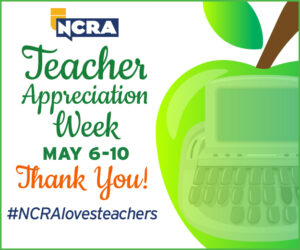 By Russell Page and Pat Miller
By Russell Page and Pat Miller
Some things do not change from steno school, when grading students who are striving for skill to the grading of papers of the skilled reporters who are striving for new heights of speed and accuracy in the Speed and Realtime Contests. For a different perspective, we thought that as people who review the contest papers, we could share the errors we saw. So many great writers participate in the contests, and little things can make a big difference. Even if you are not planning to compete in a state or national contest, we hope that these tips can help you.
- Our first piece of advice is the one we wish all contestants would take to heart: Have fun. Even though your goal in challenging yourself through steno contests may be to support a serious or professional outcome, the participation in preparing for and taking contests with your peers, where each contestant is in a game against oneself, should at the very least to be fun. And maybe at the very most, too.
- Second big reveal: Prepare the procedures for setting up, writing, and turning in the contest papers. Go through the steps so often that you have no need to doubt yourself. Make a list of what you use and check it off item by item when packing for travel to the convention. If you are not certain that some item, such as a surge protector, will be provided, pack one.
Feel confident that you have with you what you need to succeed, regardless of where you place, from your listening skills and focus to your up-to-date steno skills to all the necessary equipment on hand.
- Write with intent. Call it practice if you wish. Writing with intent means that you are writing steno in a way that maximizes your chances of winning a contest, which may simply be upping your game from the last challenge or may take you all the way to the medal round. Write a section and then play the audio to check your translation but also check your steno. What outlines may be sabotaging your speed or realtime? We know what comes up most often. See tip Five.
- Write using the guidelines as your guides. Know the contests rules and “errors or allowed” prep sheets front to back and practice with those as your guide. If you can translate in all caps for Realtime, thereby not having any capitalization errors, practice using all-caps translation so that you can give yourself a grading advantage right from the get-go. Graders are not looking for saleable transcripts. They are looking for best possible, advanced skills translation.
- Five discloses the biggest error: That is that. That shows up as a pronoun in two categories of pronoun use, as a conjunction, as an adjective, and as an adverb. It’s a big deal. It matters in contests in ways that it may not matter even in verbatim writing on the job. When you are working in Tip 3, writing with intent, practice listening for “that” and then note when you miss it as you read back to assess your take. Are there patterns to when you hear and stroke it correctly and to when you miss it? If you find patterns that you can change to improve your grade, know that it will improve your work output as well. A two-fer. A bonus.
- Don’t get fancy unless practice fancy. If you put in an open quote but not a close quote, points will be deducted even if quotes were not necessary in that instance. This is true for comma pairs. The grading guidelines are really generous about the need or lack thereof for commas. If you put a comma in that requires a partner and you miss the partner, you might begin to rack up the errors. As with “that,” commas are everywhere.
- Think of contests as a travel job for another reporting agency. You will receive formatting guidelines and preview material so that you represent the agency seamlessly and consistently with the work of the agency’s regular pool of writers. If you want the job, you follow their guide sheets. If you want to pass grading, you have to work with the guidelines at hand.
- When you are writing realtime contests, consider not writing what you don’t know will translate. An untran of three strokes is three errors at least. One missed word is one error. If you are going to try to write a word, have the skill necessary to quickly delete what didn’t translate and move on.
- When you are transcribing speed contests, don’t be in a hurry. Few contestants spend even half the time allowed per leg on any one leg. We are not remarking on contestants who “know” they didn’t pass but are transcribing “just to see” how they did. These are contestants who pass at 95 percent and above but who miss the simplest things because they didn’t just sit with each leg as if it was going to be a saleable transcript. If you don’t need the full ninety minutes per leg, great. But please do not rush and regret. The 280 Testimony is 1,400 words. Even if it takes 45 minutes to complete the transcription, that leaves 45 minutes to review, to perhaps read it backwards to catch misspellings and errors in consistency.
- There is no cell phones and no Internet use during the contest. Everyone who attends either of NCRA’s Speed and Realtime Contests is asked to turn off their cell phones and leave it outside the room. If you cannot be untethered during the contest due to life’s circumstances, it is best to sit out these events. In addition, there is no cell phone use and no Internet use during transcription. It’s you against you, no additional assists. Writer with writer, mano a keyboard, you versus the Speed of the Spoken Word. But remember tip #1 – this should be fun. Mechanical and technical interruptions that break the focus of the contestants ruin the pure joy of writing with intent. Intent to challenge. Intent to win. Turn them off and turn them in and then tune in to your inner steno writing warrior.
- Graders do not want to find errors. It is such a thrill to grade for pages before an error sneaks in. We gasp, we groan, we look for every opportunity to give back points where we can within the guidelines. We are in awe and humbled each year by the level of enthusiasm, commitment, and skill of all of the contestants who sign up and show up, who know that you can’t win if you don’t play.
Russell Page and Pat Miller, CRI, CPE, are Contests Committee members and have participated in the grading process for years.




